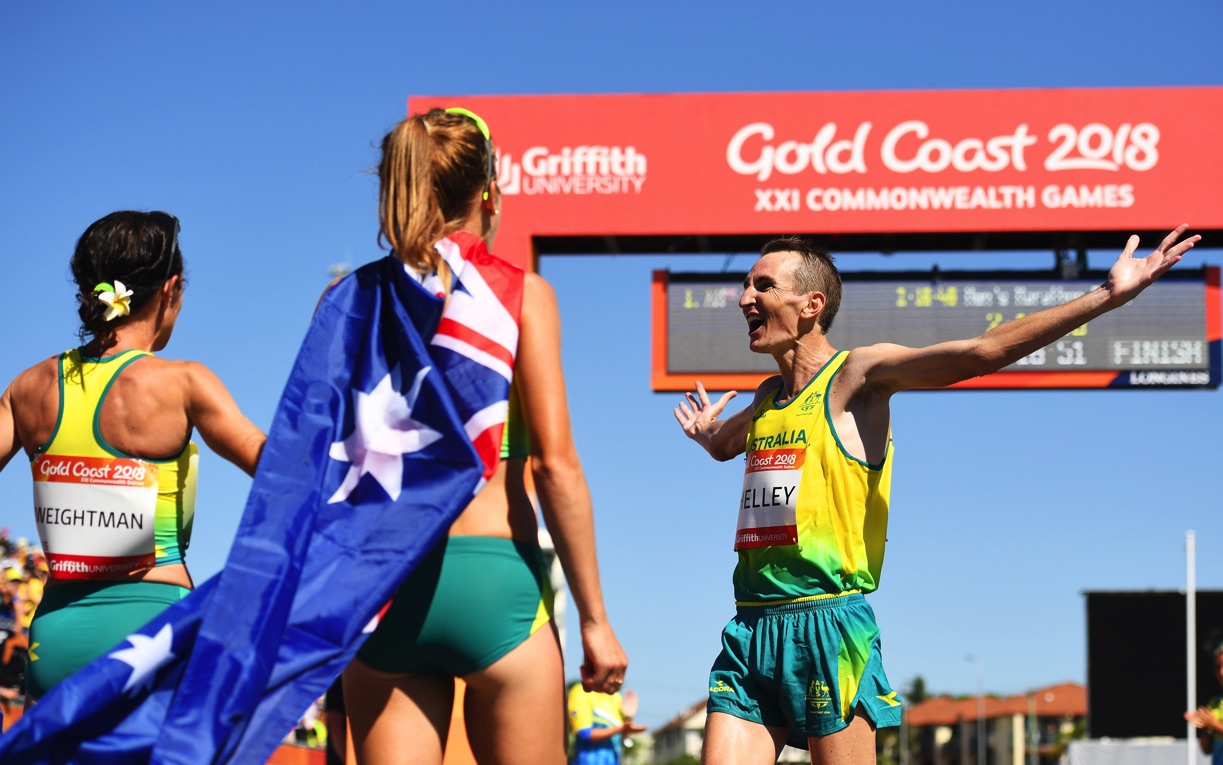The mind, like the body requires ongoing T.L.C to remain healthy. It took me about three decades and a few key moments to fully appreciate this : )
London’s 2012 Olympic Games was one of these moments.
The anticipation and excitement that I felt between crossing the Marathon finish line in Japan to qualify for my first Olympic team and toeing the start line in the green and gold five months later is difficult to describe. It was like waking up on Christmas morning as a five-year-old, on repeat. My love for the Olympics had been strong for as long as I could remember. In my early twenties I purchased a DVD collection of “Olympic Golden Moments from 1920-2002”, which despite the sketchy quality has never failed to give me goose bumps. I believed that the Olympic experience would ‘fill my cup’ to a point where it wouldn’t require topping up for a very long time. Despite the inevitable moments of stress and fatigue throughout my 2012 preparation, the Games delivered and I left the city of London overflowing with inspiration. From marching into the glistening stadium on Opening Ceremony night, to London’s roaring crowds on race day and my star-struck (but hopefully subtle) moments when idols strolled past in the Village, I had soaked up as much as I could.
In the weeks to follow however, I started to reflect on my debut experience at a deeper level. As the hype and adrenaline started to settle, thoughts about the challenges and heartache that I had witnessed in the Olympic Village and on the big screen began to surface. For every victory there had also been disappointment and that had clearly hit hard for some athletes and their teams. As a youngster I assumed that every athlete would leave the Olympics feeling proud and happy to have simply been there. I now knew this was a naïve belief. Although I was happy with my result in London, I still found the post-Games period quite challenging. I think it was the confronting realisation that despite years of commitment and everyone’s best efforts, there was no guarantee that dreams and expectations would be met on competition day. Furthermore, I no longer had a goal and the excitement of a big event on the near horizon. These factors were inevitably compounded by the emotional and physical fatigue from an intense six months, which had finally caught up with me. I remember waking up some mornings feeling unusually flat and lacking motivation. After months of reliving the special experience in conversations and speaking engagements, my mind was craving a new focus.
Set yourself a meaningful goal & then focus on what you can do ‘now’ to move towards it.
I hadn’t prepared for the confusion that crept in after my first Olympics but was able to learn from it. I am thankful that with the support of my family, coach Adam Didyk and the SA sports institute I was able to regain clarity. Reflecting on my values and setting meaningful goals gave me a focus and brought my attention back to the present. Eight years on, I have a diverse collection of strategies that help me to maintain a “sound mind, sound body” – as the Asics slogan goes, particularly following major competitions. Knowing when and how to set goals in all areas of life has been an integral tool, as are the following points that I would like to share.

Stress is not always bad.
As odd as it may sound, I like to relate my mind to a muscle – a structure with which I am very familiar as runner and a physio. Whether you prefer to knock out reps at the local track, feel the burn as you squeeze out one more calf raise or set off on an undulating trail adventure amongst nature, the stress to your muscles that these activities induce is what leads to the growth of new muscle fibres and consequent strength. The mind is not dissimilar. Everything we experience on a daily basis is a stimulus to our mind that provides an opportunity for growth. Rather than witnessing our mind swell like a muscle, we notice its growth in the form of wisdom. I find it helpful to acknowledge that a degree of stress is important for our minds, rather than associating it with only negative outcomes. Resilience is built through exposure to challenges and finding ways to not only recover but to come out stronger. I also acknowledge however that like a muscle, there is a stress threshold that must be respected to avoid damage or burn-out. Adequate recovery is the key to making positive adaptations. This leads me to my next point.
Feed your mind with high quality fuel.
Nutrition and “fuelling” play a significant role in Marathon preparation and performance. What we ingest provides us with energy to perform, the building blocks to recover and the nutrients to maintain health, as well as the fluids and electrolytes to function. If we go back to the example of a muscle; without fuel (energy) it will eventually start to fatigue, cramp and stop functioning effectively. The mind too requires fuel in the form of nutrition but also in the form of thoughts. By feeding our mind with positive thoughts and love, we can help it to perform at its best. We can achieve this by reading and listening to uplifting material, practising positive self-talk, hanging around people who respect themselves and those around them and prioritising activities that make us feel happy. I recommend thinking of a few people, resources and activities who/that fuel your mind in a positive way : ).
If it’s not working, try turning it off and on again.
I recently overheard former All Blacks player, John Kirwan on television explaining why meditation has become a vital part of his daily routine. He used the example of a computer or phone that is playing up and said “How often do you seek the assistance of an IT guru to be met with the remark – have you tried switching it off and on again?” He continued by saying that “most of the time it is that simple” (to which I could relate) and then he linked this example to the mind. Meditation is the human’s way of switching the controller off and on again. It doesn’t necessarily need to take longer than a few minutes. Whilst I don’t formally meditate on a daily basis, I love to draw and paint. I feel like art is my form of “switching off” and would encourage anyone to find an activity, if not meditation, which allows their mind to recharge.

Change it up to avoid numbness.
Every time we run, our muscles respond and adapt. Essentially, we are conditioning our body to tolerate the act of running and to become more efficient at it. Like with anything though, too much of the same stimulus over and over…. and over again can start to lose its positive effect. I would struggle to name a running coach who doesn’t endorse some form of variety in training, as a way to target different muscles and systems of the body. Let’s call it sharing the load.
As much as I love routine for planning and comfort, my mind also needs variety. If my mood or motivation is lower than usual, a spontaneous change to my regular routine usually offers the perfect pick me up – a different breakfast, new podcast or running route, creative project, fresh pair of socks (or Rundies), new topic of conversation or an unplanned catch up…. just to name a few. The sooner I recognise that an activity is becoming mind-numbing and the sooner I fire up a different part of my brain, the fresher and more positive I feel!
Keep pouring.
Earlier I alluded to my once-held belief that a climactic event or accomplishment may provide long-term contentment. I realised on return from the London 2012 Olympics that a healthy mind requires ongoing nourishment, just like a body. We can be in the best physical shape of our lives but without ongoing training and care, we will not sustain peak form. Similarly, we can experience the highest of highs but this doesn’t generally lead to an indefinite sense of satisfaction. Feelings and emotions fluctuate like our fitness does but if we give our mind what it needs to perform at its best i.e. fill our cup, we can maintain a positive trajectory.
In closing I would like to share a paragraph that I recently read in Josh Lynott’s book ‘Why don’t you’ – “Be aware of destination addiction; the preoccupation with the idea that happiness is the next place, the next job or with the next partner. Until you give up the idea that happiness is somewhere else, it will never be where you are.”
Have a great week everyone!
Jess















